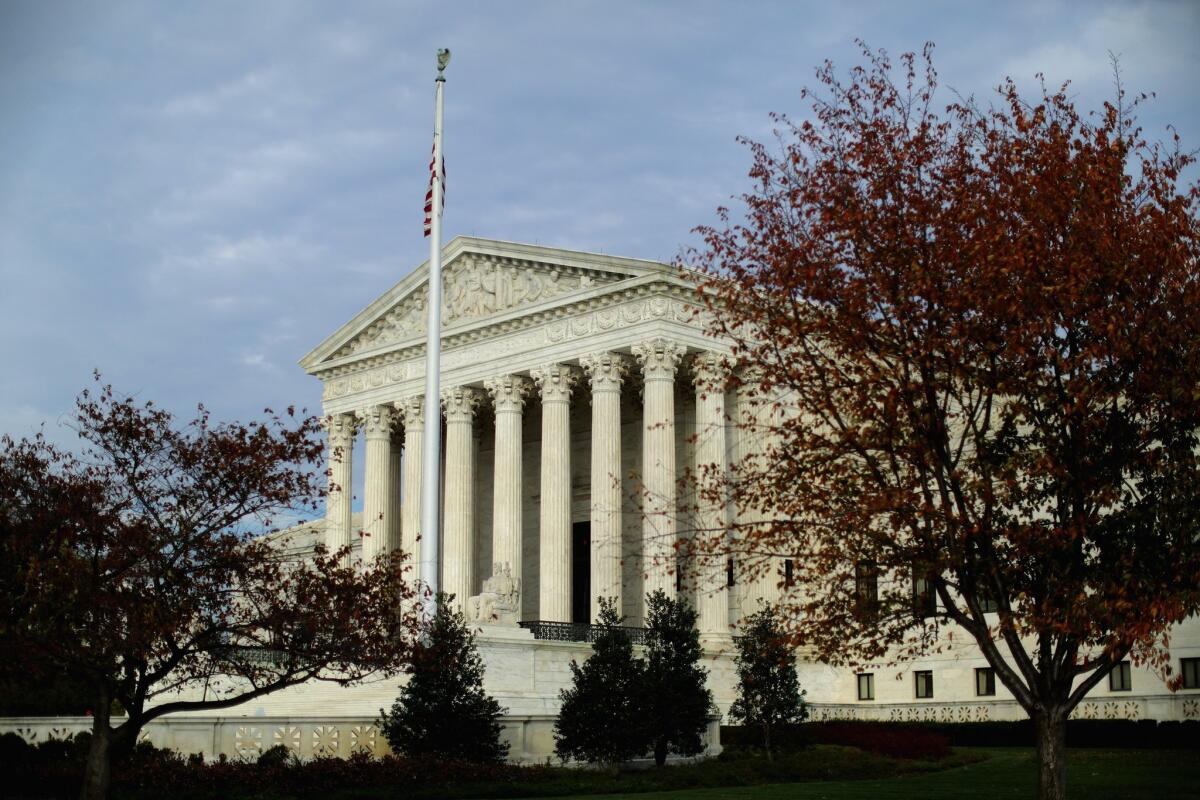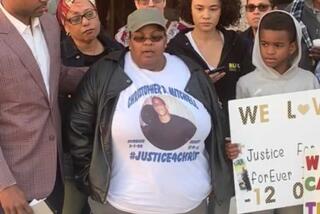Supreme Court gives broader immunity to police using deadly force in chases

The U.S. Supreme Court building in Washington.
- Share via
Reporting from Washington — The Supreme Court made it harder Monday to sue police for using deadly force against fleeing suspects, ruling that officers are immune from lawsuits unless it is “beyond debate” that a shooting was unjustified and clearly unreasonable.
By an 8-1 vote, the justices tossed out an excessive force suit against a Texas police officer who ignored his supervisor’s warning and took a high-powered rifle to a highway overpass to shoot at an approaching car. The officer said he hoped to stop the car but instead shot and killed the driver.
The ruling bolsters previous decisions that give police the benefit of the doubt when they encounter a potentially dangerous situation. The court noted in an unsigned 12-page opinion that it has “never found the use of deadly force in connection with a dangerous car chase to violate the 4th Amendment.”
In dissent, Justice Sonia Sotomayor faulted the majority for “sanctioning a ‘shoot first, think later’ approach to policing.”
The court’s decision comes at a time of growing concern over police shootings, including the killing last week of a 6-year-old Louisiana boy who was in the back seat of his father’s car.
The two officers in that case have been arrested on suspicion of murder.
In cases where officers are not prosecuted, families sometimes sue in federal court and allege a violation of the 4th Amendment’s ban on unreasonable searches and seizures. Monday’s decision could affect many such cases, including a pending appeal from Los Angeles involving the police shooting of a suspected gang member.
Los Angeles City Atty. Mike Feuer is asking the high court this week to throw out a $5.7-million excessive-force verdict in favor of a man who fled from a drive-by shooting on South Broadway Street and was then shot and seriously wounded by two officers.
Robert Contreras survived but was paralyzed. He pleaded no contest to charges of attempted murder in the drive-by shooting and served time in prison. But to the surprise of the Los Angeles Police Department and the City Council, he then sued and won a large jury verdict against the two officers who shot him.
Jurors decided that the officers acted unreasonably when they shot him in the back, and a federal judge and the U.S. 9th Circuit Court of Appeals upheld the verdict. But in the appeal, Feuer is arguing that viewed from “the officers’ on-scene perspective, not with 20-20 hindsight, their use of force was entirely reasonable under the 4th Amendment.”
The case decided Monday involved a man in Tulia, Texas, who fled from a drive-in restaurant when police tried to arrest him. He was believed to be drunk and carrying a gun. He led officers on a nighttime chase that reached 110 mph.
Texas state Trooper Chadrin Mullenix heard about the chase over his radio and drove to a spot where officers were putting a strip of spikes across the highway to puncture the tires of the fleeing car. He had been criticized for not reacting decisively in the past, and he decided on his own to shoot at the fleeing car.
His commander advised him to “stand by” and “see if the spikes work first.” But Mullenix fired six shots and killed the driver, Israel Leija Jr.
His family sued, and a federal judge ruled the case could go to a jury to decide whether Mullenix’s actions were reckless or reasonable under the circumstances. The U.S. 5th Circuit Court of Appeals agreed in a 2-1 decision and said the officer was not entitled to immunity.
That decision was upheld by a 9-6 vote of the full appeals court.
Texas state attorneys appealed, and after considering the cases for at least six weeks, the high court ruled in Mullenix vs. Luna that the officer was immune from being sued.
“By the time Mullenix fired, Leija had led police on a 25-mile chase at extremely high speeds, was reportedly intoxicated, had twice threatened to shoot officers and was racing towards an officer’s location,” the court said. “Ultimately, whatever can be said of the wisdom of Mullenix’s choice, this court’s precedents do not place the conclusion that he acted unreasonably in these circumstances beyond debate.”
Sotomayor said the court “renders the protections of the 4th Amendment hollow” by sanctioning the officer’s “rogue conduct.” She noted he had not been trained in shooting at a fleeing car and was told not to shoot before the vehicle encountered the spikes across the highway.
“When Mullenix confronted his superior officer after the shooting, his first words were, ‘How’s that for proactive?’” she wrote. “The glib comment … seems to me revealing of the culture this court’s decision supports when it calls it reasonable — or even reasonably reasonable — to use deadly force for no discernible gain and over a supervisor’s express order to ‘stand by.’”
Meanwhile, the court took no action on two other closely watched appeals — one involving shootings along the Mexican border by U.S. Border Patrol officers and the other a 2nd Amendment challenge to bans on assault weapons in the Chicago area.
Twitter: @DavidGSavage
ALSO:
University of Missouri president resigns over racial turmoil
Air Force struggles to add drone pilots and address fatigue and stress
‘Tale of two Californias’: Coastal voters upbeat on economy, inland residents anxious
More to Read
Sign up for Essential California
The most important California stories and recommendations in your inbox every morning.
You may occasionally receive promotional content from the Los Angeles Times.











